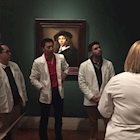Twenty-four hours after a narcotics K-9 training exercise, a United States Customs and Border Protection officer tested positive for marijuana. Decades of law enforcement experience and zero drug test failures prior could not save the veteran officer’s career after testing revealed the illegal drug in his system. Not only was the officer terminated, but he was also charged with the use of an illegal substance. With a drive to help the condemned officer, one future KCU faculty member would prove the officer’s innocence through the science of toxicology.
“As he worked for the customs service, he had tested negative for years and years. All his tests were random. Negative, negative, negative,” said Marcus Iszard, PhD, associate professor of Pharmacology.
Affidavits from other officers stated that their coworker had handled marijuana with his bare hands during the K-9 narcotics training exercise. Most notably, he continually applied a substance to his hands to help with muscle pain throughout the hot summer day. Iszard’s intuition led him to research the non-FDA-approved substance marketed to treat muscle strains and sprains.
“He was using a chemical called dimethyl sulfoxide (DMSO). I have worked in the lab with this chemical. It is an excellent vehicle for taking drugs across the dermal layers of the skin,” Iszard explained. “It can take a chemical that is on top of the skin, deposit it through the layers of the skin and hit the bloodstream. That’s the character of DMSO. It has high lipid character.”
The amount of marijuana in the officer’s bloodstream was so low, Iszard was convinced the officer had been accidentally exposed to the illegal substance. Considerably, the theory that marijuana had to be smoked or consumed to enter the bloodstream had been disproven.
“Based on my finding, the officer was awarded his employment back with the United States Customs Service after a year-and-a-half termination. He received backpay and his record was cleared,” said Iszard. “He came back to my office dressed in his uniform to tell me goodbye and thank you.”
Iszard first became interested in pharmacology and toxicology as a teenager after watching the 1970s medical drama television show "Quincy, M.E." He was always fascinated with how the main character solved a crime through analysis.
“He solved murders in an hour’s time. He would go through the elaborate process of the analytical qualitative analysis of blood and evidence,” Iszard explained. “That served as my initial introduction and excitement to enter the field of toxicology.”
Iszard graduated in 1991 from Florida A&M University College of Pharmacy and Pharmaceutical Sciences with a degree in pharmacy and toxicology. After his postdoctoral work, he decided to enter academics (Xavier University, College of Pharmacy and University of Missouri Kansas City School of Pharmacy) and private investigation and has assisted individuals, law enforcement, attorneys, and even the United States Army. He has provided court testimony, legal deposition and written reports with state and federal court systems as a certified toxicology expert as well.
“The job is extremely gratifying. I have helped put guilty people in jail; I’ve helped the wrongfully terminated get their jobs back; I’ve assisted in civil lawsuits; and helped innocent people get criminal charges dropped,” said Iszard. “I am one of only a few private investigators in the state who does this type of work. My job is to determine the role of drugs in criminal, civil, medicolegal situations.”
Iszard began his time as a professor at KCU in 2017. With more than 18 years of teaching experience in the areas of pharmacology, toxicology, therapeutics for clinical research and investigation, he loves introducing students to the world of forensics. He provides courses primarily for pharmacology and toxicology students, but also for medical, dental, and nursing professional graduate students. He often advises his students to look at every detail when beginning their research.
“You have to uncover all rocks,” he said. “You will be surprised what you find under those rocks."

_20221102135244_0.png?w=140&h=140)


(0) Comments